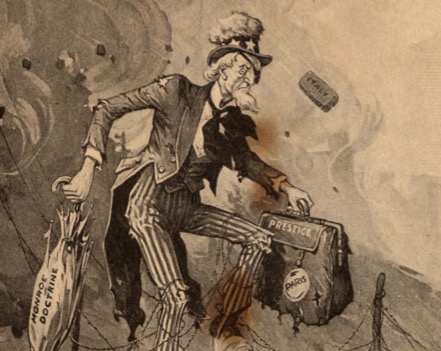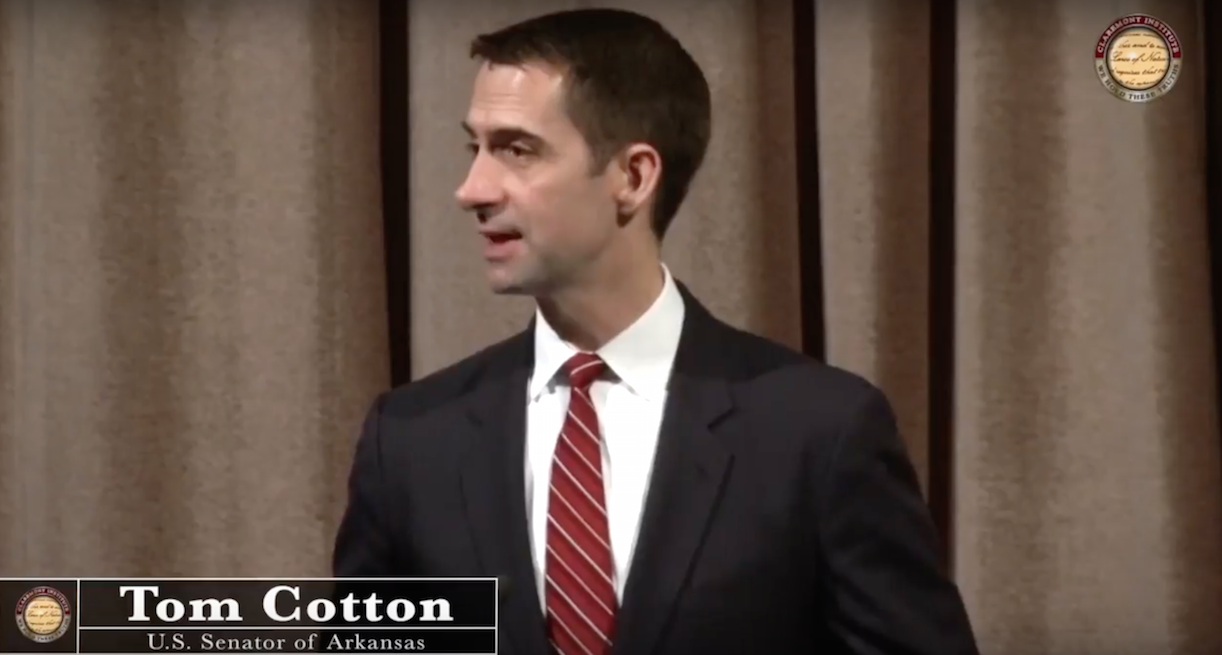America’s superior power is not a moral entitlement.
The End of Fantasy

The elite imagination is no longer the happiest place on Earth.
Almost midway into President Trump’s current term in office, the bipartisan governing elite he successfully ran against is still notably incurious about what went, from their standpoint, so terribly wrong. For Trump’s well-established (but today, not as well-established) critics, what went wrong is simple: the people. We the people, by their measure, succumbed out of weakness and immaturity to an old populist temptation—the fantasy of recovering a lost golden age that itself is a mere illusion.
Yet in their reflexive secular worship of all things cosmopolitan, global, innovative, and progressive, today’s challenged elite is the constituency that has taken imagination too far. In their hands, the politics and culture of imagination were elevated to an absolute. Their vision of morality and justice hinged on a revolutionary double premise.
First, the premise went, only by imagining a better world could we achieve a good world. Second, thanks to advances in technology and public policy, imagining that world was virtually all we needed to do—or indeed could do—to “win the future,” as former President Obama memorably put it. The machinery of progress was so well institutionalized and automated by our diverse yet conformist elite that both politics and culture converged and shrank down into dreaming the right dreams.
Yet, in a portentous irony, this minimal task took on world-historical significance. The wrong dreams—the exercise of officially unsanctioned imagination—would be catastrophic. This is the frame of mind the cosmopolitan elite applies to the Trump administration, its supporters, and, in moments of extremity, anyone suspected of failing to perform a sufficiently visible and visceral hatred of the President and his partisans. Today’s populists, nationalists, and America-firsters are, well, unauthorized dreamers, whose very presence in the body politic threatens to destroy its foundations.
Instead of seeing our founding documents and ideas and a shared repository of collective identity as the anchor of our political and moral life, the cosmopolitan elite sees us as utterly dependent upon nothing more than their “true” political science of vetted, credentialed, and correct imagination.
“If you can dream it, you can do it!” This popular credo, falsely attributed to Walt Disney in the all-too-aptly-named Science of Imagineering DVD series, defines the elite’s view of itself and its role in the world. It is a religious one, secular though it may be, and all the more primed to collapse for that. If the elite imagination soared to new heights at the so-called end of history, the coming end of fantasy promises a fast and fatal fall.
Incarnate, not Imaginary
Many of the myriad potential problems inherent to the cultish moral politics of the elite imagination have been put on stark display in the twenty-first century. The past two presidential administrations, one Democrat, one Republican, were defined by systemic shocks and crises that the experts of public imagination failed to predict, failed to process, and failed to learn from, however they managed, at tremendous and still untallied cost, to live to see another day.
But those smashing defeats, in their very spectacle, can obscure the deeper failures that helped bring them on. It should be crystal clear—yet it is apparently not—that a government of technocrats in thrall to a clerisy of imagineers is not a government owned, in Winston Churchill’s formulation, by the people. Its country is not a country of recognizably free people, and its regime not a regime where such people, if they tried, could govern themselves. No matter how well-intentioned, diligent, or dignified, the absolutist moral politics of the elite imagination runs fundamentally contrary to the ideas, the experience, and perhaps above all the memory of the American Republic.
It cuts deeply against Alexander Hamilton’s wager that the “reflection and choice” of self-governing citizens could free a people from “accident and force.” It defies the old Revolutionary credo, inherited from Scottish Presbyterian minister Samuel Rutherford, of Lex, Rex—the law, and not any person, rules. In its standard of justice, it encourages, if not compels, the replacement of the particular political community of the people with an abstract and imagined universal community. It overthrows the agency of free and equal citizens in favor of the passivity of servile subjects whose only clear duty is to demonstrate convincingly enough that they have made the official dreams their own.
In all these respects, the ruling cosmopolitan credo rejects the very idea of statecraft—and, in truth, the notion of soulcraft with which, in the west, statecraft has been characteristically intertwined. Small wonder that, having abdicated true leadership, the cosmopolitans look with disgust on the coarseness and confusion of so many of their supposed charges. But in their blindness, our elite imagineers are faltering because they have done so much to rip our imagination loose from its life-giving roots in our human and American memory.
As Sen. Cotton notes, America is an idea but not merely an idea. Rather than a disembodied figment of an abstract imagination, it is an incarnate idea, one embodied in a particular people who share a growing and shifting but specific and concrete body of deep, devoted recollection. As Abraham Lincoln counseled in his First Inaugural, “this country, with its institutions, belongs to the people who inhabit it,” its “bonds of affection” ultimately held together not by ginned-up notions or visions but “the mystic chords of memory.”
The Deletion of Dreams
Not that remembrance is an act of mysticism. Rather, Lincoln tells us, it is an exceedingly practical act, firmly rooted in both the pride and humility of our shared situation as humans and Americans. Just as the Founders designed that Congress, the most powerful of the branches of government, would slow the passions of the people without usurping their authority, Lincoln insists—on the eve of war, no less—that “nothing valuable can be lost by taking time.” The moral politics of memory, distinctly lacking this young century, is one of prudently acknowledging how quickly what has been hard-won can be lost in leaps of fancy. If the accident and force of events is allowed to knock our shared memories away, our very identity—individually and as a people—will be swiftly lost. This is Lincoln’s wisest lesson, and one about which, even now, the cosmopolitan imagineers remain in fierce denial.
The cult of imagination sacrifices statesmanship and citizenship alike at the altar of transformation, and the faster the better. In thrall to their fantasies of the future, and, more secretly, to the uneasy conviction that we have nothing at all to guide us but expertise in propagating such fantasies, the cosmopolitan elite has denied responsibility for the recurring crashes—economic and financial, cultural and political, strategic and military—of its flights of fancy, and the speed at which they chase them. At the same time, compounding their fatal error, they have refused to countenance the tremendous worldwide resurgence of the politics of memory, both in its more virtuous and vicious forms. The same willful ignorance toward the centrality of memory has led our elite to undermine our civic foundations even as their own foundations are undermined both at home and abroad.
This is why, as Sen. Cotton does, many American voters now crystallize their view of citizenship and statesmanship around the interlinked issues of immigration and globalization. A healthy American Republic, strong in its community of memory, has proven more than capable of adding millions and millions of newcomers without losing its identity in a haze of imagination. But in our ailing republic, in thrall to the fantasy that it will become more perfect only by becoming fundamentally other than what it has been since its origins, large-scale immigration has become just one especially powerful technocratic tool by which our governing imagineers enforce their dreams of universal community. In spite of our immigrant history, their fantasy is too abstract, and too at odds with reality, to sweetly strike the mystic chords of memory.
And just as the superficially unbound yet more deeply hidebound imagination of the cosmopolitan elite has failed us domestically, it failed us internationally. Both the rash idealism of the Bush years and the negligent idealism of the Obama years arose from the same abdication of statecraft in favor of grand dreams holding memory in contempt. Rule by imagination took our Cold War victory, our financial mastery, and our supremacy in technological invention and gave us endless war, economic meltdown, and a digital age in which, despite unprecedented surveillance, our adversaries hold the upper hand.
In fact, as powerfully as American history and American principles chasten our elite, it is digital technology that rebuts the imagineers most forcefully. Today, they are shocked, shocked to discover that digital is no friend to their absurd dream of universal friendship through the power of connectivity. They are beside themselves at the dawning realization that digital is strengthening authoritarian regimes, including ones that hold few illusions about progress through dreams.
That rude awakening is a sharp reminder that simply dethroning the rule of the cosmopolitan imagination is not enough to make America, rightly understood, great again. Memory can be used and abused to unjust and immoral ends. But the political memory of the Republic, we must, in turn, remember, is exceptional in the history of the world. We are not a race apart; our exceptionalism is one of continuity with our forebears, from the Enlightenment to the Middle Ages to antiquity. It is, nevertheless, ours and ours alone—ever more a city on a hill than a magic kingdom in a cloud.
The American Mind presents a range of perspectives. Views are writers’ own and do not necessarily represent those of The Claremont Institute.
The American Mind is a publication of the Claremont Institute, a non-profit 501(c)(3) organization, dedicated to restoring the principles of the American Founding to their rightful, preeminent authority in our national life. Interested in supporting our work? Gifts to the Claremont Institute are tax-deductible.
Radical self-definition destroys the self and the nation.
Protecting our regime demands more attention to reality than to realism.
With values and interests in tension, exceptionalism points in more than one direction.
Can America recover a nationalist vision of world leadership?





